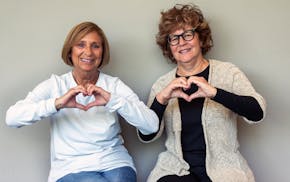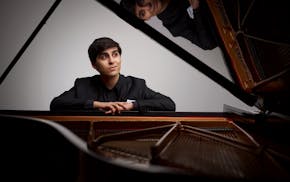John O'Sullivan was surrounded by studio lights, a gigantic screen and professional cameras. Producers fiddled with them, giving him just a minute before filming.
But a minute is all O'Sullivan needs.
Without warning, without rehearsal, he pulled out his cellphone and filmed a "sneak peek" that he'd later post to his social media accounts for One Minute Tours. As he talked, he whirled around the set. It took, in total, 40 seconds.
O'Sullivan, 39, has become a master at telling Minnesota history in one-minute chunks, a skill that's made him a star on TikTok, where he boasts 1 million likes, and Instagram, where he has 57,000 followers. The Mankato-raised Minneapolis resident has highlighted theaters, flour mills and the world's largest stucco snowman.
Now, one minute will become 20 as he launches a YouTube series, "The Hidden Middle," with a team of film and TV pros. The show, which hit its $60,000 Kickstarter goal this week, will explore the surprising connections between disparate people, histories and events. But really, it's about how Minnesota is at the center of everything, somehow.
On a recent morning, in a northeast Minneapolis studio, O'Sullivan filmed the pilot episode's introduction, which teases: How does a nude John Lennon connect to the Mall of America?
"What we're trying to do is both celebrate our region but also find these stories that don't get told," said co-producer Matt Osterman, founder of Propellant Films. The show will play to the strengths of its star, whom Osterman called "a contemporaneous volcano of cool information."
The Minnesota Star Tribune spoke with O'Sullivan about his "weird tour guide brain" and how he's built a business off of it. The conversation has been edited.
Q: How did you start giving tours?
A: I had just gotten my Irish citizenship, an Irish passport. So I decided to go overseas. One year turned into 12 years.
Q: What made you stay abroad for 12 years?
A: A connection with Ireland — my full name is John Francis O'Sullivan. But I also had this sense of wonder when I graduated, like, I can just do whatever? I couldn't believe that. I got a job crushing boxes at a retail store in Galway. I was going home but had booked a weeklong trip to Austria, and the day before my flight, the Icelandic volcano erupted and grounded every flight in Europe. But I could take a ferry, so I booked a trip to Wales, got a bit drunk at a hostel and asked for a job.
At that hostel, I met two women who would change my life: my wife, who is Australian, there on a backpacking visa, who is now the mother of my two children, and a tour guide. I asked her how you get that kind of job, because it seemed really interesting to me, and suddenly I was a guy on a bus with a microphone, traveling to 26 countries around Europe.
Q: So your wife brought you to Australia, where you started your own tour company. I remember you saying that when you came back to Minnesota, you didn't expect it to be a long-term thing.
A: My whole life has been planned by accident. During COVID-19, Melbourne was the most locked-down city in the world outside of China. We had 154 days where we couldn't leave the house. So we certainly couldn't leave the country, and we couldn't introduce my kid to her parents for the first year of her life.
I had this walking tour company, so during COVID, I thought, well, TikTok has a one-minute limit, my tours are three hours, so I have 180 videos, easy. It went kind of viral — I had 25,000 followers on TikTok, I started getting recognized on the streets, I got featured on national media. It was that novelty of the American talking about Australia.
I came here, and I knew what the template was. And it's gotten bigger than I could have ever imagined. A million views a week. I have seven people I employ here in Minneapolis.
Q. How long have you had that kind of staff?
A. At some point, someone wanted me to do a partnership, and I just named a ridiculous price, a price I thought was ridiculous, like $5,000. And they were like, yeah, that's within range. I was just shocked by it. So that was the first indication that I could actually do this. I quit my corporate job in May, I hired a sales manager in September, I hired an office manager the month after that, and in December, I hired for a social media coordinator. It felt like the moment.
Q: You had done tours in places that were foreign to you. What's it like to explore Minnesota through this lens?
A: It's awesome. You don't have the permission structure, if you grow up here, to approach this place with curiosity. Abroad, I'd give myself research assignments. Like, when I was in Croatia, I would study the Balkan Wars. Now I'm doing that here, but about the Ojibwe and Dakota people.
One thing I always hated — maybe I felt defensive about it — is when I go to other places, because other guides who were from a place would say, I'm born and bred here. But now, I have this historical memory. I know what it was like in the '91 Halloween blizzard, what it was like when we missed the field goal in '99.
Clear as day, we were in the ultrasound clinic, getting the first ultrasound for our second baby, when I heard the headline, "Minneapolis burns..." after the murder of George Floyd. I knew then it would be a long-term process. I still do walking tours, and we do a stop in Minneapolis at the Hennepin County Government Center, where we talk about what it's been like since 2020.
Q: What kind of questions do people have about that?
A: When I raise the topic, you can feel people get on edge. One of the skills I've had to develop is talking about tough topics in a way that isn't tough, in a way that everyone feels included and welcomed. I don't shy away from expressing my opinion about it, but I think I also don't make people feel put off if they have a different opinion. I always approach controversial issues, like, there's a controversy. [He holds out his hand, as if inspecting an object.] Let's look at it all together. People over here see it this way. Others see it this way.
That story, in particular, is one that we have not reckoned with as a community. We have to talk about it. I think that's true of all hard things.
Q: I recently read "How the Word Is Passed" by Clint Smith, which looks at how the South grapples with slavery through its historical sites. And it got me thinking about the power of a tour.
A: Totally. A tour is one of the only places in society today where people from different walks of life come together and commune in their different experiences. I've led walking tours that are three hours long and multiday tours that are two weeks long, and no matter which one it is, there's an element of vulnerability that comes with that.
You're out of your element. And I think that creates a space for someone to have a changing experience.
Q: Tell me about "The Hidden Middle."
A: I've been doing One Minute Tours for five years now. The appeal, early on, was: "60 seconds on the clock. Let's go!" And now, I'm not challenged by that. Matt has an interest in nurturing the creator community here in Minnesota. So we started talking and decided to work together, hiring our third co-producer, Chris Parr. We got a whiteboard, brainstormed ideas and hit on the concept of the hidden middle. It's a concept that is very much in my voice, but lets us go for a 20-minute episode. It's kind of like six degrees of separation but for history, or policy, or city planning.
Q: I saw you answering folks' questions about the project on Reddit. What do people get wrong about you? Right about you?
A: I think what they see is enthusiasm. I was literally voted most enthusiastic in high school. But sometimes I'll do stuff that's more political or controversial, and they're surprised by that. I'm billed as the enthusiastic Minnesota guy, but then the U.S. Justice Department report on the Minneapolis Police Department came out, and I was really upset by the police union's response to it. It really pissed me off, so I went outside one of the precincts in Northeast and I had a moment.
I think people were taken aback by it. I wasn't just the one-dimensional, did-ya-know fun fact person.
Q: But how could you be only that? I mean, you're dealing with history.
A: My least favorite comment is, "Get out of politics. Stick to tour guiding." Which is such an insane statement. The very creation of our state, these borders drawn by people in Washington that went across Indigenous lands, Scandinavian people who, like, suddenly move into these unoccupied places. Well, why is that? There's a reason for that. There's a whole other story there.
I don't know how you talk about how this place was planned without talking inequity, injustice and all the rest.

Embrace Minnesota's growing seasons at these 76 farmers markets

Old School Jewish Matchmakers offer timeless perspective on dating

The Big Gigs: 10 top concerts to see in the Twin Cities this week

Meet the budding indie-pop singer who moved to Minneapolis after gaining stardom

